Age-associated impaired plasmacytoid dendritic cell functions lead to decreased CD4 and CD8 T cell immunity
- PMID: 20953722
- PMCID: PMC3168606
- DOI: 10.1007/s11357-010-9191-3
Age-associated impaired plasmacytoid dendritic cell functions lead to decreased CD4 and CD8 T cell immunity
Abstract
Increased susceptibility to infections, particularly respiratory viral infections, is a hallmark of advancing age. The underlying mechanisms are not well understood, and there is a scarcity of information regarding the contribution of the innate immune system, which is the first line of defense against infections. In the present study, we have investigated the effect of advancing age on plasmacytoid dendritic cell (PDC) function because they are critical in generating a robust antiviral response via the secretion of interferons (IFN). Our results indicate that PDCs from the aged are impaired in their capacity to secrete IFN-I in response to influenza virus and CPG stimulation. Additionally, we observed a severe reduction in the production of IFN-III, which plays an important role in defense against viral infections at respiratory mucosal surfaces. This reduction in IFN-I and IFN-III were a result of age-associated impaired phosphorylation of transcription factor, IRF-7. Furthermore, aged PDCs were observed to be impaired in their capacity to induce perforin and granzyme in CD8 T cells. Comparison of the antigen-presenting capacity of aged PDC with young PDC revealed that PDCs from aged subjects display reduced capacity to induce proliferation and IFN-gamma secretion in CD4 and CD8 T cells as compared with PDCs from young subjects. In summary, our study demonstrates that advancing age has a profound effect on PDC function at multiple levels and may therefore, be responsible for the increased susceptibility to infections in the elderly.
Figures
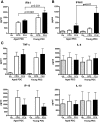
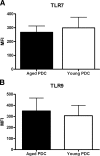
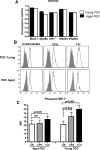
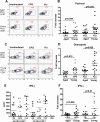
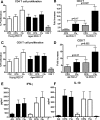
References
-
- Agrawal A, Agrawal S, Cao JN, Su H, Osann K, Gupta S. Altered innate immune functioning of dendritic cells in elderly humans: a role of the phosphoinositide 3-kinase-signaling pathway. J Immunol. 2007;178(11):6912–6922. - PubMed
-
- Ank N, West H, Bartholdy C, Eriksson K, Thomsen AR, Paludan SR. Lambda interferon (IFN-lambda), a type III IFN, is induced by viruses and IFNs and displays potent antiviral activity against select virus infections in vivo. J Virol. 2006;80(9):4501–4509. doi: 10.1128/JVI.80.9.4501-4509.2006. - DOI - PMC - PubMed
-
- Ank N, Iversen MB, Bartholdy C, Staeheli P, Hartmann R, Jensen UB, Dagnaes-Hansen F, Thomsen AR, Chen Z, Haugen H, Klucher K, Paludan SR. An important role for type III interferon (IFN-λ/IL-28) in TLR-induced antiviral activity. J Immunol. 2008;180(4):2474–2485. - PubMed
Publication types
MeSH terms
Grants and funding
LinkOut - more resources
Full Text Sources
Medical
Research Materials
